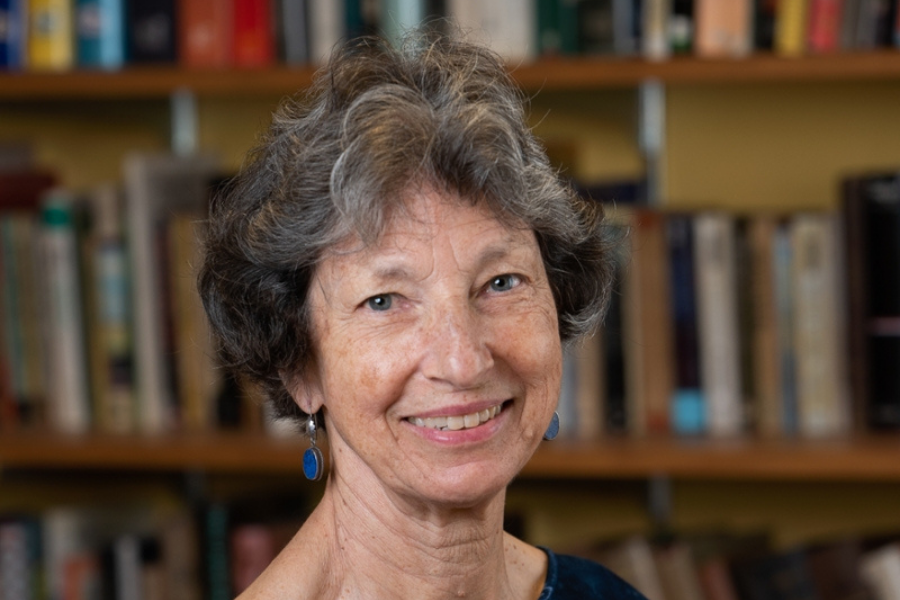
Linda Flower Wins the 2020 James R. Squire Award
By Sarah Voorhees
Professor of English Linda Flower received the 2020 James R. Squire Award for her transforming influence and lasting intellectual contribution to the teaching profession. Flower studies cognitive processes and local public rhetoric. Over the course of her career, she has published numerous books, started Pittsburgh’s Community Literacy Center, created Carnegie Mellon University’s Community Think Tank series, and taught countless students how to understand the cognitive processes of reading and writing.
In 1973, Flower earned her PhD from Rutgers University and began a one-year visiting appointment in the Carnegie Mellon English Department. When she was asked to start a writing program for CMU’s MBA students, she started to look “for a more substantive approach for teaching them to write,” Flower explained. Flower met John R. “Dick” Hayes, a psychology professor, and they began research on cognitive processes in writing.
“He was studying problem-solving in designers, and I said, ‘How about writing?’ We started meeting every week and talking about ideas, and pretty soon we wrote a proposal and started doing research,” says Flower, “For me, it turned out to be a wonderful answer to how to teach these MBAs, who are going to be going out into a complex world really soon, how to think about writing.”
In 1978, Flower was giving a conference paper on the problem-solving research and Richard Young (who became the founding head of the Rhetoric program at CMU) was in the audience. And the following year she was invited to take his place at the University of Michigan for a semester. Two years later, she joined the Department of English at CMU, and published her first book, Problem-Solving Strategies for Writing, based on this new field of research she and Hayes had named “cognitive rhetoric.” Starting 1986, she and Dick Hayes served as Co-Directors of The National Center for the Study of Writing and Literacy at Berkeley and Carnegie-Mellon for the next ten years.
Then in 1990 Flower took an early-morning walk that altered the course of her career. At an Arizona conference, on a stroll with Wayne Peck, M.Div., Harvard, then a Rhetoric PhD at CMU, he suggested that Flower should consider teaching students in underserved communities around his church—people who do not have access to the same resources as those at CMU. She took the comment to heart. The next year Flower and Peck started the Community Literacy Center on Pittsburgh’s Northside.
At the Literacy Center, urban teenagers and their CMU mentors were encouraged to challenge one another’s ideas, drawing on Flower’s recent research into the critical role of rival hypothesis thinking played at CMU. Some students considered voicing a different opinion to be “dissing” someone. When the teenagers renamed the practice “rivaling," they began to have open discussions about their opinions and experiences. Students wrote about their lives, from their work experiences to their interactions with the police. They drafted newsletters and led public conversations with teachers, families, and community members. Watching these students come to use their voices, Flower became drawn to ways ordinary people can use rhetorical problem-solving to create social change.
Initiated in 2001, the Carnegie Mellon Community Think Tank began as cross-cultural, cross-hierarchy problem-solving dialogues focused on local social issues, such as welfare to work. Since then these student-managed Think Tanks have turned to campus issues ranging from CMU’s Culture of Stress to her class’s current inquiry into the challenges of student leadership.
In 2008, in Community Literacy and the Rhetoric of Public Engagement, Flower began to explore the deliberative potential of local publics and how to support it. The book received the Rhetoric Society of America Book Award in 2009 for the best work in rhetorical studies.
Flower’s research has evolved over the years, but she remembers her earliest research on problem-solving and cognition with real pleasure. “The sense of discovery was incredible,” she says. Flower wrote her first book standing, “with a big old 1940 Underwood typewriter on the window sill radiator,” in her CMU office overlooking Frew Street. “I wrote that book as if I were talking to people. I walked around like I was giving a lecture on this really interesting stuff, or I wrote to my students,” she says.
Now, Flower has received a career recognition for her work. The James R. Squire Award from the National Council of Teachers of English was awarded “for her transforming influence and lasting intellectual contribution to the profession.”
“Those words couldn’t have been more meaningful to me. That’s what you set out to do as a researcher, a teacher, a rhetor—to somehow make a difference. That was moving,” says Flower.